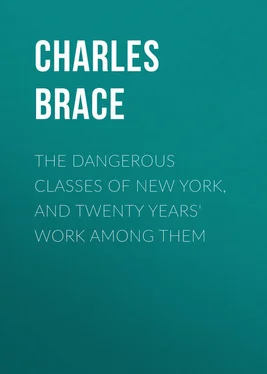Charles Brace - The Dangerous Classes of New York, and Twenty Years' Work Among Them
Здесь есть возможность читать онлайн «Charles Brace - The Dangerous Classes of New York, and Twenty Years' Work Among Them» — ознакомительный отрывок электронной книги совершенно бесплатно, а после прочтения отрывка купить полную версию. В некоторых случаях можно слушать аудио, скачать через торрент в формате fb2 и присутствует краткое содержание. Издательство: Иностранный паблик, Жанр: foreign_antique, foreign_prose, на английском языке. Описание произведения, (предисловие) а так же отзывы посетителей доступны на портале библиотеки ЛибКат.
- Название:The Dangerous Classes of New York, and Twenty Years' Work Among Them
- Автор:
- Издательство:Иностранный паблик
- Жанр:
- Год:неизвестен
- ISBN:нет данных
- Рейтинг книги:5 / 5. Голосов: 1
-
Избранное:Добавить в избранное
- Отзывы:
-
Ваша оценка:
- 100
- 1
- 2
- 3
- 4
- 5
The Dangerous Classes of New York, and Twenty Years' Work Among Them: краткое содержание, описание и аннотация
Предлагаем к чтению аннотацию, описание, краткое содержание или предисловие (зависит от того, что написал сам автор книги «The Dangerous Classes of New York, and Twenty Years' Work Among Them»). Если вы не нашли необходимую информацию о книге — напишите в комментариях, мы постараемся отыскать её.
The Dangerous Classes of New York, and Twenty Years' Work Among Them — читать онлайн ознакомительный отрывок
Ниже представлен текст книги, разбитый по страницам. Система сохранения места последней прочитанной страницы, позволяет с удобством читать онлайн бесплатно книгу «The Dangerous Classes of New York, and Twenty Years' Work Among Them», без необходимости каждый раз заново искать на чём Вы остановились. Поставьте закладку, и сможете в любой момент перейти на страницу, на которой закончили чтение.
Интервал:
Закладка:
Yet, with all this, a more light-hearted youngster than the street-boy is not to be found. He is always ready to make fun of his own sufferings, and to "chaff" others. His face is old from exposure and his sharp "struggle for existence;" his clothes flutter in the breeze; and his bare feet peep out from the broken boots. Yet he is merry as a clown, and always ready for the smallest joke, and quick to take "a point" or to return a repartee. His views of life are mainly derived from the more mature opinions of "flash-men," engine-runners, cock-fighters, pugilists, and pickpockets, whom he occasionally is permitted to look upon with admiration at some select pot-house; while his more ideal pictures of the world about him, and, his literary education, come from the low theatres, to which he is passionately attached. His morals are, of course, not of a high order, living, as he does, in a fighting, swearing, stealing, and gambling set. Yet he has his code; he will not get drunk; he pays his debts to other boys, and thinks it dishonorable to sell papers on their beat, and, if they come on his, he administers summary justice by "punching;" he is generous to a fault, and will always divide his last sixpence with a poorer boy. "Life is a strife" with him, and money its reward; and, as bankruptcy means to the street-boy a night on the door-steps without supper, he is sharp and reckless, if he can only earn or get enough to keep him above water. His temptations are, to cheat, steal, and lie. His religion is vague. One boy, who told me he "didn't live nowhere," who had never heard of Christ, said he had heard of God, and the boys thought it "kind o' lucky" to say over something to Him which one of them had learned, when they were sleeping out in boxes.
With all their other vices, it is remarkable how few of these smaller street-boys ever take liquor. And their kindness to one another, when all are in the utmost destitution, is a credit to human nature. [Only recently, a poor hump-backed lad in the Newsboys' Lodging-house gave his dollar, and collected nine more from the boys, for the family of the children who were lost in New Jersey.]
Their money is unfortunately apt to slip away, especially for gambling and petty lotteries, called "policy-tickets." A tradition in the remote past of some boy who drew a hundred dollars in these lotteries still pervades the whole body, and they annually sink a considerable portion of their hard-earned pennies in "policy-tickets."
The choice of these lads of a night's resting-place is sometimes almost as remarkable as was Gavroche's in "Les Miserables." Two little newsboys slept one winter in the iron tube of the bridge at Harlem; two others made their bed in a burned-out safe in Wall Street. Sometimes they ensconced themselves in the cabin of a ferry-boat, and thus spent the night. Old boilers, barges, steps, and, above all, steam-gratings, were their favorite beds.
In those days the writer would frequently see ten or a dozen of them, piled together to keep one another warm, under the stairs of the printing-offices.
In planning the alleviation of these evils, it was necessary to keep in view one object, not to weaken the best quality of this class – their sturdy independence – and, at the same time, their prejudices and habits were not too suddenly to be assailed. They had a peculiar dread of Sunday Schools and religious exhortations – I think partly because of the general creed of their older associates, but more for fear that these exercises were a "pious dodge" for trapping them into the House of Refuge or some place of detention.
The first thing to be aimed at in the plan was, to treat the lads as independent little dealers, and give them nothing without payment, but at the same time to offer them much more for their money than they could get anywhere else. Moral, educational, and religious influences were to come in afterward. Securing them through their interests, we had a permanent hold of them.
Efforts were made by the writer among our influential citizens and in various churches, public meetings were held, articles written, the press interested, and at length sufficient money was pledged to make the experiment. The board of the new Society gave its approval, and a loft was secured in the old "Sun Buildings," and fitted up as a lodging-room, and in March, 1854, the first Lodging-house for street-boys or newsboys in this country was opened.
An excellent superintendent was found in the person of a carpenter, Mr. C. C. Tracy, who showed remarkable ingenuity and tact in the management of these wild lads. These little subjects regarded the first arrangements with some suspicion and much contempt. To find a good bed offered them for six cents, with a bath thrown in, and a supper for four cents, was a hard fact, which they could rest upon and understand; but the motive was evidently "gaseous." There was "no money in it" – that was clear. The Superintendent was probably "a street preacher," and this was a trap to get them to Sunday Schools, and so prepare them for the House of Refuge. Still, they might have a lark there, and it could be no worse than "bumming," i. e., sleeping out. They laid their plans for a general scrimmage in the school-room – first cutting off the gas, and then a row in the bedroom.
The Superintendent, however, in a bland and benevolent way, nipped their plans in the bud. The gas-pipes were guarded; the rough ring-leaders were politely dismissed to the lower door, where an officer looked after their welfare; and, when the first boots began to fly from a little fellow's bed, he found himself suddenly snaked out by a gentle but muscular hand, and left in the cold to shiver over his folly. The others began to feel that a mysterious authority was getting even with them, and thought it better to nestle in their warm beds.
Little sleeping, however, was there among them that night; but ejaculations sounded out – such as, "I say, Jim, this is rayther better 'an bummin' – eh?" "My eyes! what soft beds these is!" "Tom! it's 'most as good as a steam-gratin', and there ain't no M. P.'s to poke neither!" "I'm glad I ain't a bummer to-night!"
A good wash and a breakfast sent the lodgers forth in the morning, happier and cleaner, if not better, than when they went in. This night's success established its popularity with the newsboys. The "Fulton Lodge" soon became a boys' hotel, and one loft was known among them as the "Astor House."
Quietly and judiciously did Mr. Tracy advance his lines among them.
"Boys," said he, one morning, "there was a gentleman here this morning, who wanted a boy in an office, at three dollars a week."
"My eyes! Let me go, sir!" And — "Me, sir!"
"But he wanted a boy who could write a good hand."
Their countenances fell.
"Well, now, suppose we have a night-school, and learn to write – what do you say, boys?".
"Agreed, sir."
And so arose our evening-school.
The Sunday Meeting, which is now an "institution," was entered upon in a similarly discreet manner. The lads had been impressed by a public funeral, and Mr. Tracy suggested their listening to a little reading from the Bible. They consented, and were a good deal surprised at what they heard. The "Golden Rule" struck them as an altogether impossible kind of precept to obey, especially when one was "stuck and short," and "had to live." The marvels of the Bible – the stories of miracles and the like – always seemed to them natural and proper. That a Being of such a character as Christ should control Nature and disease, was appropriate to their minds. And it was a kind of comfort to these young vagabonds that the Son of God was so often homeless, and that he belonged humanly to the working classes. The petition for "daily bread" (which a celebrated divine has declared "unsuited to modern conditions of civilization") they always rolled out with a peculiar unction. I think that the conception of a Superior Being, who knew just the sort of privations and temptations that followed them, and who felt especially for the poorer classes, who was always near them, and pleased at true manhood in them, did keep afterward a considerable number of them from lying and stealing and cheating and vile pleasures.
Читать дальшеИнтервал:
Закладка:
Похожие книги на «The Dangerous Classes of New York, and Twenty Years' Work Among Them»
Представляем Вашему вниманию похожие книги на «The Dangerous Classes of New York, and Twenty Years' Work Among Them» списком для выбора. Мы отобрали схожую по названию и смыслу литературу в надежде предоставить читателям больше вариантов отыскать новые, интересные, ещё непрочитанные произведения.
Обсуждение, отзывы о книге «The Dangerous Classes of New York, and Twenty Years' Work Among Them» и просто собственные мнения читателей. Оставьте ваши комментарии, напишите, что Вы думаете о произведении, его смысле или главных героях. Укажите что конкретно понравилось, а что нет, и почему Вы так считаете.












